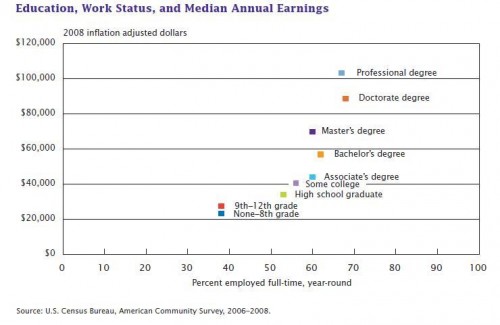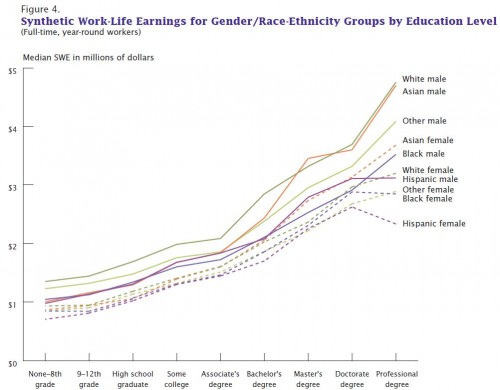The Census Bureau posted some information about the economic payoff of a college degree on their blog, Random Samplings. A recent report indicated that educational level had a bigger impact than any other demographic factor on lifetime earnings. More education leads to both higher incomes not just because those with more education receive higher salaries, but also because they are more likely to be in full-time jobs. The x-axis here shows the % of people in full-time, year-round jobs:
Not surprisingly, the gap in earnings widens over time, especially for those with a bachelor’s or higher degree compared to those with less:
The report also estimated lifetime earnings by race/ethnicity for men and women separately. As they point out, except for a couple of cases at the very highest educational levels, men from even the most economically disadvantaged racial/ethnic groups out-earn women from the most economically advantaged ones:
Of course, not all college degrees are equal. Dolores R. sent in a link to an interactive table from the Wall Street Journal that lets you look at earnings and the unemployment rate for various majors. I sorted them by median earnings; here are the ten with the lowest median earnings:
The highest unemployment rate? Clinical psychology, at 19.5%.
You can also search by area (art, engineering, etc.), though it looks like the categorization may be a little sketchy — for instance, “geology and earth science” and “liberal arts” show up under the arts.
For more on college majors, earnings, and future career opportunities, see the report College Clusters: Forecasting Demand for High School through College Jobs, 2008-2018, from the Georgetown University Center on Education and the Workforce.






Comments 17
Anonymous — November 15, 2011
'Clinical psychology' is not a field of study at the undergraduate level in the way that history, chemical engineering, or geology is. Put simply, a person with a BA in psychology is a clinical psychologist in the same way that a person with a BA in biology is a medical doctor.
So does that mean there's a 19.5% unemployment rate for people with MAs and Ph.Ds in clinical psychology? Or is this survey awkwardly trying to capture the percentage of students with a B.A. in psychology and a professed interest in clinical psychology who remain unemployed? Or something else entirely?
Jirka Lahvicka — November 15, 2011
How did they solve the endogeneity problem? I don't see (for example) any instrumental variables or regression discontinuity design, so is it just another paper that mistakes correlation for causation?
LatentContent — November 15, 2011
teacher education: multiple levels - should be in the other list: top ten earning.
Education and Earning Potentials…Which Majors Have the Lowest Unemployment? « Welcome to the Doctor's Office — November 15, 2011
[...] From Soc Images by Gwen Sharp, [...]
Lunad — November 16, 2011
Anyone else notice that almost all of the bottom earners are traditionally female gendered or "care" professions, while top earners are masculine gendered STEM professions?
LizzBoBizz — November 18, 2011
Let's hear it for the Actuaries!!
Samireann — February 6, 2012
i dont get how they would earn that much in one day in this one webcite.
Just another WordPress site — September 1, 2018
[…] Race, education, and earning potential […]
William — June 2, 2020
The report also tells age income by cast / ethnicity for men and women individually. I am trying for resume editing services now. As they point out, except for gender issues at the highest levels of education, men from even the most economically disadvantaged parts of the world can be admitted to women from the benefits of wealth- economy:
G Nelson — August 13, 2020
There is a strong relationship between education and earning issue for men and women.This website is helping to get video games, on the other hand, this report shows actual statement in sociological effects.
Timothy Banfield — March 11, 2023
Education and earnings potential are closely linked, as higher education levels generally lead to higher earnings potential over the course of one's career. Studies have shown that individuals with higher levels of education tend to earn more money than those with lower levels of education. This is particularly true for college graduates, who tend to have higher salaries and more job opportunities than those without a degree. However, the cost of higher education can be a significant burden for students, which is why many are looking for ways to earn money while they study. For students seeking remote jobs, there are many options available, including online tutoring, freelance writing, and other flexible opportunities. To find the best jobs for college students, check out the website https://www.discoverybit.com/5783/full-time-student-guide-find-job-flexible-hours/ which provides resources for finding remote jobs for college students that fit their busy schedules.
babyyyblueee — July 14, 2023
I can honestly say that many students need help from such services. I am not an exception, and I have recently cooperated with statement of purpose writers and was very pleased with the quality of the work.
samibaceri — September 3, 2023
Education plays a huge role indeed, but it's important to note that the education process is highly tiring and stressful. Thanks to sites like https://studymoose.com/free-essays/diabetes with diabetes essay examples and other topics, everything wasn't that complicated for me, but I believe that people who do everything themselves spend too much time and energy on that.
sam — April 17, 2024
"Juniper Questions Answers is a valuable hub for all things Juniper Networks. Whether you're a novice or an expert, this platform offers a space to ask burning questions and find insightful answers. From troubleshooting network issues to mastering the latest Juniper technologies https://www.ace4sure.com/Juniper-exams.html users can tap into a wealth of knowledge shared by fellow enthusiasts and industry professionals.
Allen — June 26, 2024
CompTIA PT0-002 Dumps Questions are a set of practice questions and answers designed to help candidates prepare for the CompTIA PenTest+ (PT0-002) certification exam. These dumps provide a comprehensive review of the exam topics, including penetration testing planning, scoping, information gathering, vulnerability identification, exploits, and reporting. By using these practice questions, candidates can familiarize themselves with the exam format, types of questions, and key concepts, increasing their chances of success on the actual test.